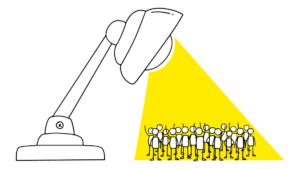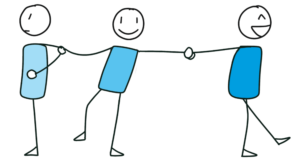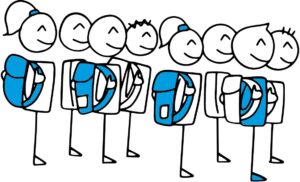A few months ago at Netmind, we started the “Change Management, art and practices up to date” Community. A Community in which we seek to contribute and encourage the exchange of knowledge, experiences and approaches that help modernize the practice of Change Management.
With this community, we want to contribute to decapsulate the discipline so that it ceases to be a competence of a specific area and bring it closer to all areas and people in the organization. We believe that this is the path that will lead us to adaptation and continuous learning.
After the launch, we organized the first meeting of the Community. This meeting aimed to get to know each other, talk about the challenges we face, and share techniques to help us be better prepared for change.
As it was the first time we had met, we wanted to take the opportunity to reinforce the message of the Community’s purpose, which we were able to describe in these words but which fell short of conveying all our passion:
“In this community, we pursue the goal of sharing and disseminating new approaches that help us inspire, influence, lead and facilitate the necessary changes in our organizations, bringing a human, people-centered vision as a key lever to ensure the success of the change. #PeopleBasedTransformation.”
“More human organizations?” What does it mean?
When it was my turn to tell it in my own words, I came out saying, almost without thinking, that the purpose of the Community is to “contribute to making organizations more human.” After I said it, I realized all that this phrase entailed, and I thought, “what does this mean? How does it translate into something concrete? How can we contribute to that purpose?”
Reflecting on that, I realized that at Netmind, when we talk about modern, updated Change Management, what we come to say is just this:
- Let’s take the focus away from models, from frameworks.
- Let’s avoid the temptation to fall into recipes, and let’s go to work where things happen.
- Let’s go to work where people are.
The focus in change management is on people.

In this sense, I also realized that all the Change Management courses we offer and even the services have this approach of putting people at the center. Because if there is something we constantly repeat, companies don’t change; people do.
There is a big difference in how people live the changes that are desired and sought by themselves (moving, changing jobs, or starting a personal project) and between those that are imposed or unexpected (economic crisis, change of organizational structure, or working with Scrum…). We experience the desired changes with enthusiasm, positivism, and imposed changes with uncertainty and pessimism.
In this new paradigm of change, where every change generates new change, I believe that we cannot afford to continue thinking that there are people who are resistant to change, with the connotation that the proposed change is good and that these people are incapable of seeing it.
I believe that they are people with reasons and circumstances that think that it is not the best time to change, that they are not ready.
I also believe that when we talk about more humane organizations, what we have to seek to understand is the causes that lead people to feel unprepared. Why is it not their time? What else do they need? What do they lack?

In the vast majority of texts and bibliography on change management, much emphasis is placed on being very clear about the vision of change:
- What do we want to achieve?
- How are we going to behave when we have managed to change?
- What organization are we going to be?
A gap analysis is usually made between the current situation, where we are now and where we want to be, in order to think about what actions we can activate to start walking along that road that will take us, with curves and counter-curves, and perhaps through poorly marked routes, to the desired destination.
From this gap analysis come out proposals, initiatives that we set in motion and where we put a lot of effort, resources, will, desire… however, the damned resistors are still there, resisting. What’s wrong with them? Why don’t they move? Why don’t they walk?
In general, what they lack are tools.
People who have to walk the path of change, and do not feel confident to do it with the tools they have at that moment, will see it as a dangerous path, full of uncertainty. They will probably feel alone, incapable, not knowing who to count on when they get lost or have difficulties moving forward.

In practical terms, we start new paths almost every day, but we often do not realize it; there is no clear beginning…
This is precisely the paradigm of constant change: constantly moving and assuming new changes, living them as part of an extensive path, which may never end, but which brings us closer to where we want to be.
In this context, leaders are responsible for acquiring tools to generate an environment conducive to progress, to pave and mark the way. Let’s not forget that they also have to cross the road.
But many times, they send someone else to explore it first and then come back and tell them how it went… why? Because they may also feel they don’t have the necessary tools to do what they have to do: influence the environment, move obstacles, make decisions about which path to follow when we get lost…
Regardless of the role, responsibilities and years of experience we have, when faced with an unwanted and uncertain change, what we all probably feel is fear. And it is that fear that generates resistance.
Let’s be encouraged to talk about the things we feel, also in organizations. Let us be encouraged to acquire tools that help us manage people’s emotions and not people.
Join our Change Management Community!
We invite you to be part of the Change Management community to continue sharing reflections, experiences and tools that will help all of us to promote changes 😉
(Spanish speaking community)
Join now